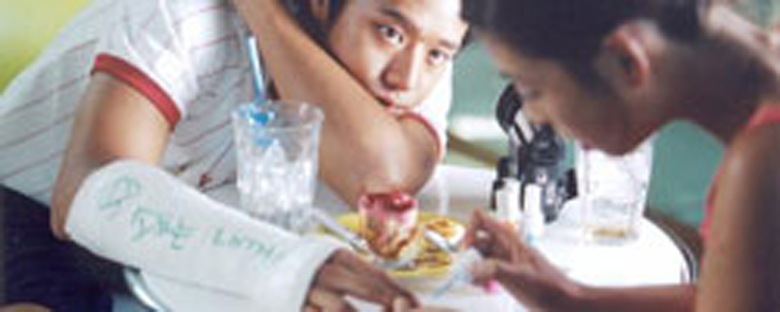Reviews
Tae-poong-tae-yeong
Jeong Jae-eun
South Korea, 2005
Credits
Review by Leo Goldsmith
Posted on 07 September 2006
Source VHS screener
Related articles
Features: The New York Korean Film Festival
Following the international success of her debut film Take Care of My Cat, the story of five girls whose friendships change as they leave high school, Jeong Jae-eun returns with another story about teenage friendship, here with a slightly higher octane. Centering around the urban youth world of “aggressive” in-line skating and shot with an endless cache of slick camera vaults and pirouettes, Jeong’s second feature charts the path of a high-school boy, Soyo, as he falls in with a bunch of in-line skaters, struggling to learn their tricks and their ethics, and navigating the disapproval of the adult generation.
The Aggressives falls soundly into the realm of films like The Karate Kid, BMX Bandits, Gleaming the Cube, and this year’s Step Up, films that not only carry with them the dramatic conventions of youth culture, proving that it’s hard out there for a pimply teenager, but also situate their dramas in the milieu and fashion of a popular (usually athletic) trend. In this format, the trend is transformed into a symbolic and literal form of expression for the “youth of today” as it is represented onscreen. For Macchio’s Daniel, karate is both a defensive skill and an expression of inner strength, individuality, and the benefits of hard work. For Soyo, in-line skating is similarly a testament to the skater’s resilience and ingenuity, but it is also a youthful countercultural practice, bonding the often rowdy but well-intentioned kids against the unsympathetic generation of their parents. It is a highly flexible story of the problems of growing up and of finding acceptance among your peers and elders, and as such, it forms the archetype of a story that can be retold as many times as there are popular trends to exploit.
In Jeong’s film, however, exploitation is part of the problem. Soyo and his aggressive compatriots skate all over town, even participate in competitions, but their countercultural integrity makes them wary of growing up and selling out. One of their members, and Soyo’s idol, Mogi, even refuses to compete, claiming that he fears that competition will taint the free spiritedness of his beloved sport. And when circumstances necessitate that Mogi allow his skill to be exploited for commercial purposes, he sabotages the situation, further proving that in-line skaters are little more than a bunch of unruly, uncooperative punks.
But as Soyo learns, Mogi’s reservations about competing (and cooperating) are less a sign of integrity than of fear of getting older. Seeing his friend deteriorate and his values questioned, Soyo, the group’s junior member, learns a succession of lessons about growing up and being a man, and in turn makes good on his quasi-oedipal interest in Mogi’s girlfriend, the group’s resident documentarian (and not a skater). But even as these situations mount, The Aggressives is less about interpersonal rivalries than it is about striking out on your own. Soyo’s entry into the world of in-line skating, precipitated by the desertion of his white-collar criminal parents, was originally about finding a new family. Ultimately, he learns the values of being one’s own man, about the value of leaving his friends behind, even while treasuring memories of the old days.
We don’t do comments anymore, but you may contact us here or find us on Twitter or Facebook.



